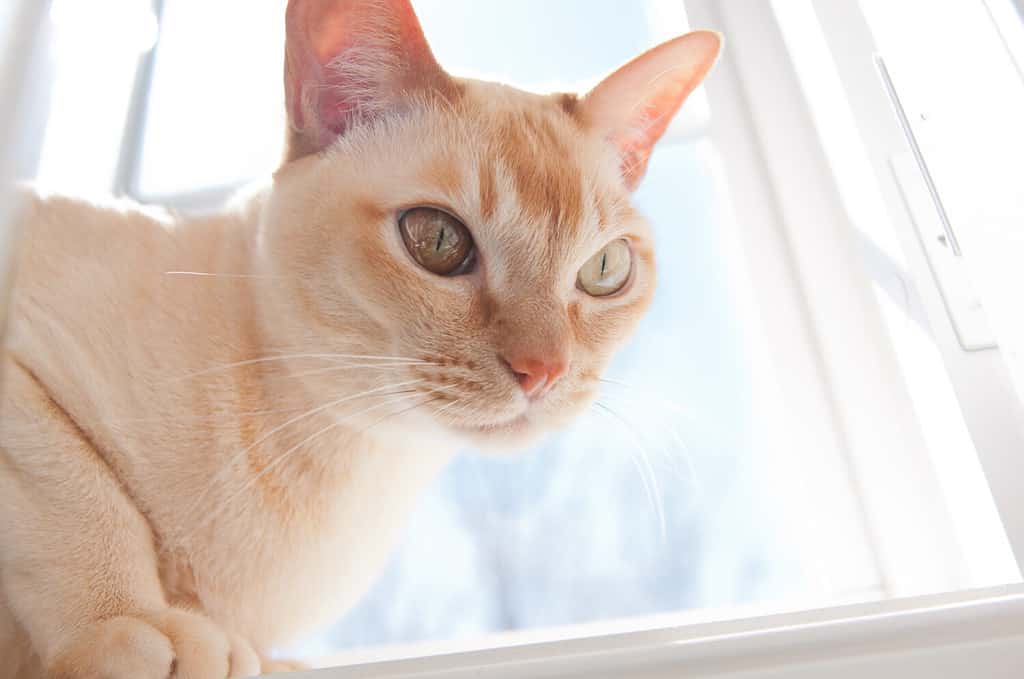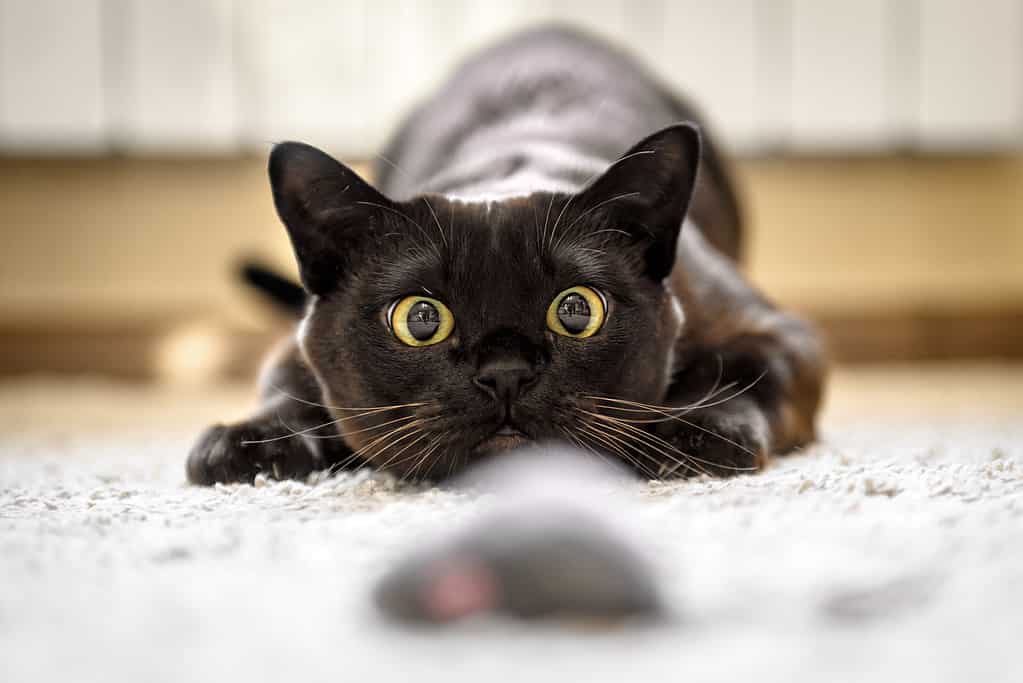Your cat is standing on your windowsill, its gaze fixated on something outdoors when it starts chattering and chirping. What is going on? Discover three reasons cats chirp and chatter at birds! Plus, learn if it’s something you should worry about or encourage!
What Is Cat Chirping and Chattering?
When a cat chirps, it sounds kind of like a bird. It’s a quick vocalization that your cat makes. This is not a long sound like a howl or easily heard like a meow. It’s quieter and may even go unnoticed in a noisy environment. When a cat chatters, the sound is also short and bird-like, but the vocalization is repeated several times. This often happens when a cat is standing by a window looking outside at birds. During these vocalizations, cats open their mouths and show their teeth while their cheeks and whiskers vibrate with the sounds they make. Chattering is also called twittering and chittering.

A cat by a window may start to chirp and chatter when it spots something outdoors.
©Lynne Bentley/Shutterstock.com
3 Reasons Cats Chirp and Chatter at Birds
1. They Saw Something Tasty
Yes, even indoor cats that have never lived outdoors have this hunting instinct! According to the Humane Society of the United States, chattering occurs when a cat has spotted a potential snack outdoors. It could be a bird or a squirrel! If you pay attention to your cat while it’s chirping and chattering, you can see that it’s completely fixated on an outside animal. This hyperfocus is a skill your kitty would use if it were outdoors hunting. It would stalk its meal, crouch down, get closer, and finally go in for the kill. This is called a prey sequence. A cat left to its own devices outdoors hunts for food instead of relying on its doting human to open its wet food can!
2. They’re Both Excited and Frustrated
The chirping and quick chattering sounds cats make also signal their excitement. They are predators, after all. When they spot a potential meal, they’re thrilled! Surely, you can relate to the excitement you feel when your favorite meal is placed on the table in front of you. The aroma and visual appeal of a good recipe can get your mouth to water before any morsel even touches your lips. This chattering sound in cats is a similar response. It’s the excitement of knowing there could be something yummy just ahead. Interestingly, it’s also a self-soothing response. They have to keep themselves contained and the chattering may even be an involuntary response!

Cats are predators and have hunting instincts.
©scaliger/iStock via Getty Images
Now, unless your cat spends time hunting outdoors, it’s restricted by doors and windows. It may experience some frustration with the inability to reach its prey. But cats love the thrill of the hunt. Remember when your furball was a kitten, and your ankles were the target of their hunting prowess? They’re excited by the chase and even out in the wild, they can’t always capture their prey. This is ultimately a stimulating activity for them as they get to enjoy the excitement and employ their hyperfocus as they watch a bird fly around the trees, or a squirrel climb up your fence.
3. They’re Clever — So They Mimic
Cats may have also adapted to make these vocalizations in an attempt to lure their prey closer. If they sound like birds, birds may not realize that a predator is afoot. If they manage to fool a bird into thinking it’s safe around another bird, the cat has a sudden advantage. It can more easily ambush a bird and make a successful kill. It’s not just your cute kitty with its toy chest and lush bedding that responds to prey this way. Their much larger counterparts in the wild like mountain lions also chirp and chatter. It’s easy to forget your purring cuddle bug is a natural-born killer but cats, even those hand-raised and bottle-fed, are predators!
Should You Worry?
Not at all! In fact, you can encourage the chirping and let your kitty enjoy its natural instincts. This is not the type of behavior you need to redirect. For your kitty, it’s a blast! If your cat doesn’t already have good access to a large window, set up a spot for them to watch the ultimate reality TV. A window-mounted perch works great but you can get as fancy as you want! Don’t always leave them hanging, though. They want to use their natural hunting instincts and you can help them enjoy their time indoors by engaging in interactive play with them daily. Try a food puzzle that makes them work for their treats and get creative with play sessions, incorporating both wands and chaser toys. These activities help your cat enjoy the satisfaction of catching their “prey,” while they remain safe, content, and satiated indoors and under your watchful care.
The photo featured at the top of this post is © sophiecat/Shutterstock.com
Thank you for reading! Have some feedback for us? Contact the AZ Animals editorial team.







